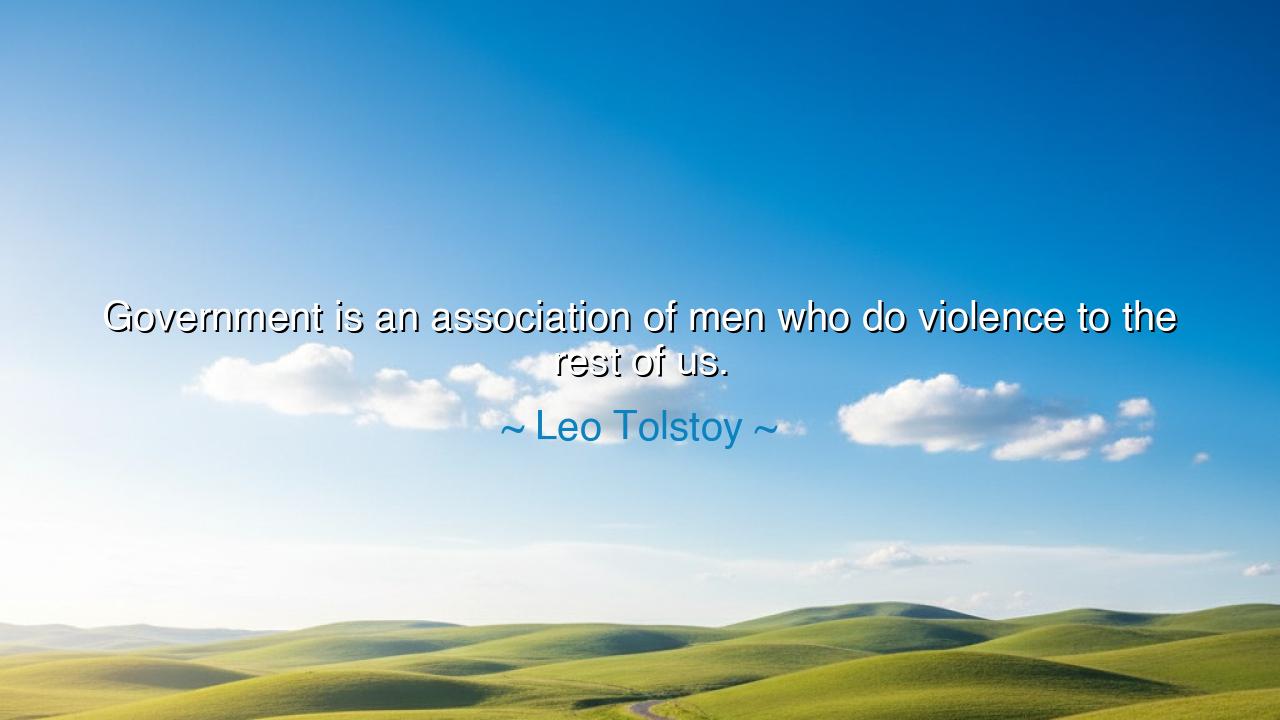
Government is an association of men who do violence to the rest






The words of Leo Tolstoy — “Government is an association of men who do violence to the rest of us.” — strike like a thunderclap from the heavens, both terrible and illuminating. In this searing declaration, the great Russian novelist and moral philosopher tears away the veil of grandeur that so often cloaks the state. Beneath the banners, the speeches, and the laws, Tolstoy sees something raw and primal — power maintained by force, obedience extracted by fear, and a system that, however refined in form, rests upon the threat of violence. His words are not meant to shock for their own sake, but to awaken: to make men and women see the foundation of their political order as it truly is, and to ask whether such a foundation can ever be righteous.
The origin of this quote lies in Tolstoy’s later years, when he had turned from the novelist of human passion to the prophet of moral conscience. After writing War and Peace and Anna Karenina, he was tormented by the question of evil and authority. He came to see the state — all states, whether czarist or democratic — as built upon coercion, sustained by armies, prisons, and taxes enforced at the point of a bayonet. To Tolstoy, every government, no matter how noble its words, was an institution that compelled men to do what their conscience might forbid, and punished those who dared to resist. Thus, he declared that government itself is violence — an organized, legalized force exercised by a few over the many.
His insight was born from the soil of his homeland. Tolstoy lived under the Russian Empire, a world of oppression, censorship, and hierarchy. He saw peasants starved by taxation, soldiers conscripted to die in wars they did not understand, and thinkers silenced for speaking truth. Yet he also saw that even when tyrannies fell, the new governments that rose in their place soon behaved the same. The flag changed; the methods remained. “An association of men,” he called them — not gods, not saints, but ordinary mortals who claimed the divine right to command others, always in the name of “order” or “the public good.” In this, Tolstoy saw the great tragedy of civilization: that mankind, seeking peace, entrusts its liberty to those who preserve peace by means of violence.
History, time and again, has borne witness to the truth of his words. Consider the revolutions of France, where kings were overthrown in the name of liberty — only for new rulers to rise and wield the guillotine against their own brothers. Consider the wars fought for democracy, where armies march not only to defend freedom but to impose it. Even the most benevolent governments, Tolstoy warned, enforce their will through punishment and fear. A man who refuses to pay his taxes is jailed; a protestor who challenges authority is beaten or silenced. Thus, beneath the robes of justice lies the hand of coercion — and beneath every law, the shadow of the sword.
Yet Tolstoy did not speak these words in despair. Rather, he sought to awaken the moral conscience of mankind. He believed that violence — even when wrapped in the language of law — corrupts both ruler and ruled. The ruler learns to justify cruelty in the name of duty; the citizen learns to obey injustice in the name of order. The remedy, Tolstoy believed, was not revolution but spiritual awakening — the refusal of men to participate in evil. He called for a new kind of courage: not the courage to kill for one’s beliefs, but to suffer for them without hatred. His ideas inspired generations of peaceful resisters — from Mahatma Gandhi in India to Martin Luther King Jr. in America — who proved that the human spirit, guided by love and truth, could overcome even the mightiest governments without raising a sword.
Gandhi himself once said that Tolstoy’s philosophy of nonviolence “entered my heart as truth.” When Gandhi led the Indian people in defiance of British rule, he did not seek to destroy the government by force; he sought to shame it by justice, to expose the absurdity of an empire that claimed to be civilized yet ruled through violence. His marches, his fasts, and his imprisonment were acts of moral power — proof that the spirit, when steadfast in peace, is stronger than any empire’s army. In this, Tolstoy’s warning finds its redemption: though governments are founded upon violence, the conscience of the individual can still triumph through nonviolence.
So let this teaching be handed down to every generation: see power for what it is, and never mistake fear for virtue. Government may be necessary, but it is never sacred; its authority must always answer to the higher law of conscience. Let men and women remember that laws have no life without the obedience of those who follow them — and that every unjust command loses its strength the moment a soul dares to say, “No.” The true strength of humanity lies not in the force that compels, but in the love that liberates.
And thus, remember the eternal wisdom of Leo Tolstoy: violence cannot build peace, and coercion cannot breed virtue. Governments may rise and fall, but the spirit that refuses to harm or to hate will endure beyond all thrones and empires. Seek justice not through domination, but through compassion. Serve truth not with the sword, but with the heart. For the only government worthy of man is the government of conscience — the reign of truth within the soul, untouched by violence, unshaken by fear.






AAdministratorAdministrator
Welcome, honored guests. Please leave a comment, we will respond soon